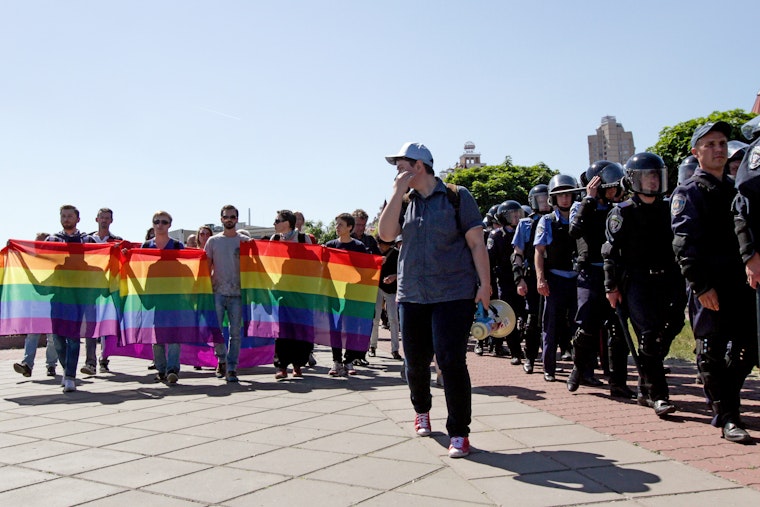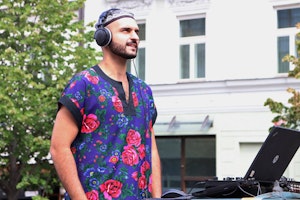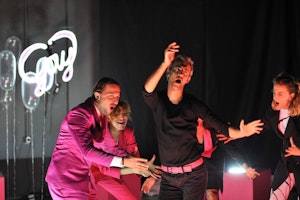Despite Some Violence, Ukraine’s LGBTI March Draws Remarkable Support
By Nazarii Boiarskyi

We heard the warnings from the authorities countless times: the Equality March, part of this year’s KyivPride forum, would be too risky, too vulnerable to violence. The mayor Vitali Klitschko called it a frivolous celebration, tactlessly scheduled during a time of military aggression in Eastern Ukraine. And indeed, as the march began on Saturday in the city center, masked homophobic extremists attacked the event, beating up several participants and lobbing nail-spiked projectiles that wounded nine policemen, one of them critically.
Yet when I look back on this week’s events and the months of preparation that led up to them, the violence—and the local authorities’ reticence to preempt it—is not what I will remember. Instead I’ll remember the largest ever LGBTI rights event in my country’s history, held just one year after a previous march was canceled altogether because of security considerations.
A year and a half ago, in the wake of the Maidan protests that helped usher in Ukraine’s current government, Ukrainians rose up in revolution to reclaim their dignity. Last weekend, despite skepticism expressed at nearly every official level, the country’s remarkable support for a march staged by lesbian, gay, bisexual, transgender, and intersex people showed that Ukrainians are more willing than ever to fight for equality.
The march, which consisted of some 300 participants, attracted human- and LGBTI-rights activists, artists, journalists, foreign dignitaries, and two elected officials—a first for Ukraine. Overall, up to half of the attendees were there as allies of the LGBTI community, an impressive achievement in a country where only recently LGBTI activism was a marginal cause. So many people wanted to be a part of the event, in fact, that the organizers had to turn away dozens more eager participants at the urging of the Kyiv police, whose capacity to guarantee marchers’ safety was limited.
Meanwhile, many of Ukraine’s major public figures condemned all violence against the marchers. President Petro Poroshenko stated that he didn’t see any obstacles to prevent the festival from taking place. It was the first presidential statement of this kind not only in Ukraine, but in most of the post-Soviet region. Suddenly, the Equality March appeared to be sparking exactly the kind of conversations it was meant to.
This outpouring of support—whether for LGBTI rights explicitly or, more generally, for our right to assemble freely—comes at a time of increasing recognition that homophobia is a systemic problem in Ukraine. While the government has declined to include LGBTI-specific language in its antidiscrimination legislation, or include LGBTI rights in its national strategy, signs point to a gradual shift in public opinion on such rights, despite the more visible right-wing hate-mongering that makes the news.
For instance, a recent court case brought against the arsonists who burned a popular movie theater in central Kyiv during an LGBTI film festival has elicited widespread outrage, in part because of the way the perpetrators have flaunted their homophobia. Other attacks against LGBTI establishments have received similar attention.
For me, perhaps most touching were the dozens of letters festival organizers received in the countdown to the Equality March from Ukrainians of all walks of life and from every region, including those writing from annexed Crimea, the embattled Donbass region, and those displaced internally by the conflict. The march, many wrote to say, should be held despite the fighting and would have their full support.
While these spontaneous gestures will not change life for same-sex couples unable to marry, adopt children, visit their partners in the hospital, or bury those partners (an increasingly relevant issue in the current conflict), they are an indication that many Ukrainians may be ready for a cultural change. They are also a counterpoint to the Russian state media’s allegations that fascism and intolerance permeates the Ukrainian government and the Ukrainian people.
While a great deal more work remains to be done, it appears that many have learned over the last several difficult months that it is only through solidarity that we will grow as a country. Though violent extremists continue to threaten our advancement and should be taken seriously, the fact that an LGBTI rights march could carry on in Kyiv, despite the disruptions, for 500 meters—in contrast to the 100 meters it stretched in 2013—signals progress.
As for the march itself, we have already begun to consider our strategy for 2016, when we may open it up to the broader public. In the meantime, the LGBTI community has collected a significant amount of money for the critically wounded police officer, whose support we will also remember when we look back on a landmark day for human rights in Ukraine.
The Coalition for Combating Discrimination in Ukraine is a grantee of the International Renaissance Foundation, Open Society’s foundation in Ukraine.
Nazarii Boiarskyi is a member of the organizing committee of KyivPride2015 and co-chair of the Coalition for Combating Discrimination in Ukraine.


